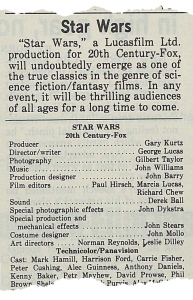
THR’s May 20, 1977, review (inset) said Guinness was “outstanding” as Obi-Wan, a part that would earn him an Oscar nom for supporting actor.
The Hollywood Reporter

By the time Alec Guinness was offered $150,000 in January 1976 ($762,000 today) to play Obi-Wan Kenobi in Star Wars — a character revived by Ewan McGregor in subsequent films and now in the miniseries Obi-Wan Kenobi, debuting May 27 on Disney+ — the 61-year-old actor already was a screen legend, having appeared in more than 50 films, including his Oscar-winning role as Colonel Nicholson in David Lean’s 1957 masterpiece The Bridge on the River Kwai. Obi-Wan, however, would send Guinness to another stratosphere entirely, one he was not always comfortable occupying.
Director George Lucas pitched the Jedi master role to him as “a blend of the wizard Merlin and a Samurai warrior,” Guinness told an interviewer after the film became a worldwide smash. “You can’t beat that. And unlike most space fantasy, the characters George Lucas has created aren’t cardboard. And the story is gripping. There’s a quest, encounters with other forms of life, and conflict between good and evil.” Privately, however, Guinness had dismissed the script to friends as “fairy tale rubbish” before accepting the part for which he will forever be best remembered. He only did so after 20th Century Fox agreed to his demand that they double the initial offer and — rather ingeniously — tack on 2 percent of the backend grosses, with Lucas throwing in another .25 percent as a goodwill gesture once filming had wrapped.

THR’s May 20, 1977, review (inset) said Guinness was “outstanding” as Obi-Wan, a part that would earn him an Oscar nom for supporting actor.
The Hollywood Reporter
The film opened May 25, 1977, and Guinness’ stunned response to its reception was captured in his diary. On May 27: “Splendid news of reaction to Star Wars continues to come in.” On June 3: “Am pinning my hopes on Star Wars percentage which could bring me £100,000 or more if it does Jaws business, as predicted.”
The film exceeded Jaws‘ business, grossing over $300 million in its initial release — earning Guinness more than $7 million immediately ($33 million today) and an estimated $95 million by the time of his death in 2000 at 86. Despite that unheard-of salary for what amounted to 20 minutes of screen time, Guinness was reluctant to come back for a sequel.
Over lunch at Morton’s in 1979, Lucas asked him if he would consider returning for “a couple of days” of work on Star Wars II — later known as The Empire Strikes Back. One week later, Guinness wrote in his diary, “I said yes to a day’s work on Star Wars II … It’s dull rubbishy stuff but, seeing what I owe to George Lucas, I finally hadn’t had the heart to refuse.”
This story first appeared in the May 25 issue of The Hollywood Reporter magazine. Click here to subscribe.